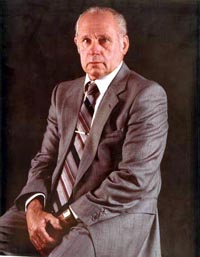 |
||
| Issue No 85 | 23 February 2001 | |
NewsVale: Charlie Fitzgibbon (1922-2001)By Zoe Reynolds
The man who gave the union movement industry superannuation, leave loading and the Accord has died.
Charlie Henry Fitzgibbon, a former general secretary of the Waterside Workers' Federation, and an executive member of the Australian Labor Party, the Australian Council of Trade Unions and the International Transport Workers' Federation passed away on Monday, February 19 after a long illness. Speaking at the Palmdale Crematorium service on the NSW Central Coast on Friday, February 23 were Bill Kelty, former ACTU secretary, Ray Gietzelt, AO, former general secretary of the Miscellaneous Workers' Union and family. "The labour movement has produced great people - prime ministers, premiers, judges, union and community leaders," said Bill Kelty. "These people play a very special role in this nation, providing a legacy beyond their years. Charlie Fitzgibbon, former wharfie's leader was among the best. Without doubt he was one of our most competent union leaders." It was under the leadership of Charlie Fitzgibbon that the Waterside Workers Federation (now the MUA) established workers' superannuation, the Waterside Workers' Credit Union, permanency, voluntary redundancy, leave loading and the 35 hour week - all firsts in the labour movement and all achieved during the first decade after Fitzgibbon's election in 1961. Many of these conditions then flowed onto other unions. "There is no worker in this country who does not owe Charlie," said Kelty, appointed by the ACTU to voice the collective appreciation of the union movement and pay tribute to Fitzgibbon. "Every day they work and every day they retire, all working people have a debt to Charlie. He was a wonderful person. A giant. A hero." Fitzgibbon was also one of the architects of the Prices and Incomes Accord, as senior vice president of the ACTU, working closely with friends Bill Kelty and former PM Bob Hawke. "Charlie was a mentor to political leaders and a lynchpin of the ACTU," said Kelty. Charlie Henry Fitzgibbon was born in Newcastle. As a young man he witnessed the terrible effects of the Great Depression. "It was this experience that influenced him to do what he could to make this world a better place for all," said Ray Gietzelt. "After the death of Jim Healy in 1961, Charlie Fitzgibbon burst onto the national industrial and political scene." Charlie was regarded as labour right and there was much speculation at the time that the union and the labour movement would shift likewise. But Charlie stamped his own independent branch of progressive policies on the Federation and none doubted his outstanding ability and devotion to the cause of working men and women worldwide. He served on the International Transport Workers' Federation as chairman of the dockers section and as Australian Workers' Delegate to the International Labour Organisation. Other posts held by Charlie Fitzgibbon were on the ALP NSW Central Executive (1960s), ACTU executive (1967-1983) Central Executive of the ALP (1959-1971), ALP Administrative Committee (1971-1977), Chair, ITF Dockers' Section (1974-83) Commissioner of the Australian Shipping Commission (1973) Director of of the Reserve Bank of Australia (1983-1993), Member of the Steel Industry Authority (1982-1984) Commissioner of the IAC (1985-1986) Officer in the Order of Australia (1980) Charlie Fitzgibbon is survived by his step daughter Valerie, grandsons David and Douglas. Also attending the service were MUA National Secretary Paddy Crumlin, former secretaries John Coombs and Tas Bull, retired union leaders Fred Peterson (TCFUA), Alec McLagen (ETU), Barry Joy (TWU), Neil Swancott (formely MEAA, IFJ, now LHMU) National Secretary LHMU Jeff Lawrence, family, friends and MUA members.
|
The new Workplace Relations minister relives his own union background and explains why he�s really just another worker at heart. Honestly. Australia might be burning, but is it a fire that can be brought under control? SDA delegate Maria Kavaratzis recounts how the Campsie Big W has been transformed into a union shop. Neale Towart looks back at how popular culture has treated those workers who have not considered themselves part of the collective. The Korean Metal Workers Federation recounts a week which culminated in violent attacks on workers outside the Daewoo factory. The millennial deadline might have passed, but Jubilee 2000 is not giving up the fight for debt cancellation for the world�s fifty-two poorest countries. As Africa attempts to deal with the HIV crisis, access to the medicines that can relieve victims� suffering is emerging as a major humanitarian issue. John Howard has claimed the Liberal Party�s decimation in Western Australia and Queensland as a triumphant vindication of his party�s embracing of the national competition policy. As we ponder the One Nation renaissance, a new book challenges the current debates around xenophobia and the perceived threat of danger from Asia.
Notice Board View entire latest issue
|
|||||||||||||||||||||||||||||||||||||||||
|
© 1999-2000 Labor Council of NSW LaborNET is a resource for the labour movement provided by the Labor Council of NSW URL: http://workers.labor.net.au/85/news92_charlie.htmlLast Modified: 15 Nov 2005 [ Privacy Statement | Disclaimer | Credits ] LaborNET is proudly created, designed and programmed by Social Change Online for the Labor Council of NSW |
|


![[Workers Online]](/images/logo_small.gif)